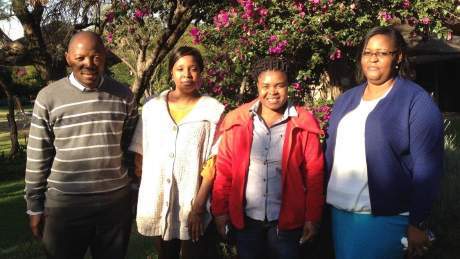From the left Michael Mahlalela – Quality Assurance Officer, Georgina Shabangu – Quality Assurance Officer, Sybil Sthembiso Dlamini – National Accreditation Focal Point and Phindile Dlamini – Chief Quality System Administrator. Photo: Viktoria Lindberg Martinell
The development of the national regulatory and quality infrastructure in Swaziland has taken momentum the last years. A national quality policy has been adopted by the government and an action plan for its implementation has been to prepare, based on which the further development of the national regulatory and quality infrastructure will take place. A part of the process is that a number of related laws and regulations have been drafted and adopted.
Representatives from the relevant institutions and stakeholders in Swaziland have participated in the Sida funded international training programme Quality infrastructure Development in Support of World Trade. An integral part of the participation in the training programme is that the participants work on need driven change projects that are identified by their institutions. The projects support the participating countries in establishing the preconditions for change through the participants being provided with information and experiences about the international rules that govern international trade and best know practices. The participants from Swaziland have from the outset mostly focused in their projects on developing the overall structures and systems needed in the country to enable fulfilment of the international rules and best practices. This has included support in the work on preparing and adopting a National Quality Policy that was approved by government of Swaziland in 2010 and the development on an action plan for its implementation.
The Ministry of Commerce, Industry and Trade nominated four officers from the Regulatory and Quality Infrastructure Development (RQID) Department for participation in the programmes 2013. These participants are now working with a project titled: Swaziland Quality Infrastructure Reform Project. The project’s overall objective is to strengthen the national Quality Infrastructure to align it better with international rules and best practice. The project includes the development of quality infrastructure legislations, a technical regulatory framework, compliance with international standardization work and promotion of a quality culture. The scope of the project was therefore to review and develop legislations and structures to support the quality policy of 2010 and to gather all knowledge gained through the training programme and to put the system in line with the international best practice.
The most important outcome from the project so far has been the analysis and revision of the Technical Regulations and Quality Infrastructure Bill and the Technical Regulations Framework Bill, expected to be decided on in the next 6 months.
The project also focuses on the implementation of the quality management system according to ISO 9001, first of all in the Ministry of Commerce, Industry and Trade, and secondly to continue with the work in other Ministries. “It is very positive that the government understands the need to implement this and fully support the project work. The decision to develop and adopt the policy and implementation plan has helped us in this process”, says Sybil Sthembiso Dlamini. The Quality Management System is being implemented in the Ministry where the work on process mapping is ongoing. “We are now seeking for support to develop a web based Quality Management System (QMS), such as the one Swedac has introduced to us during the training in Sweden. If we could be supported by Sida and Swedac regarding training and development of such a system that would be great!”, the participants express.
The participants recognize that the knowledge acquired during the training programme in Sweden regarding the implementation of the standard ISO/IEC 17020 on accreditation of inspection bodies has been useful for them. The two participants, who are the National Accreditation Focal Point, have been able to facilitate training of conformity assessment bodies in their country. However most of the training of accreditation standards is done by the Southern African Development Community in Accreditation Service (SADCAS).
The international training programme has also helped the participants to understand the importance of technical regulations and technical standards and to better articulate issues in relation to quality infrastructure in general. This will improve their ability to manage the process towards a well-functioning quality infrastructure in Swaziland. “The training has been an eye opener to the Regulatory and Quality Infrastructure Development Department and has helped align the quality Infrastructure for Swaziland according to International best practice using the principles of WTO Agreement”, says Phindile Dlamini.
To conclude, much has been achieved so far but there is still work to be done in Swaziland before a well-functioning regulatory and quality infrastructure is fully in place. Swedac hopes to be able to continue the co-operation with the relevant stakeholders in the country to support the processes.

